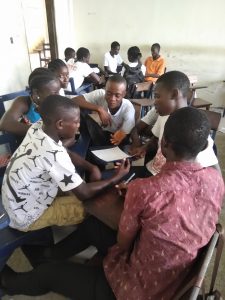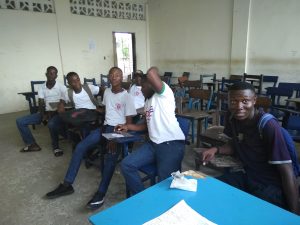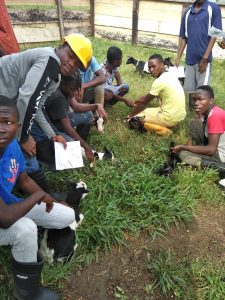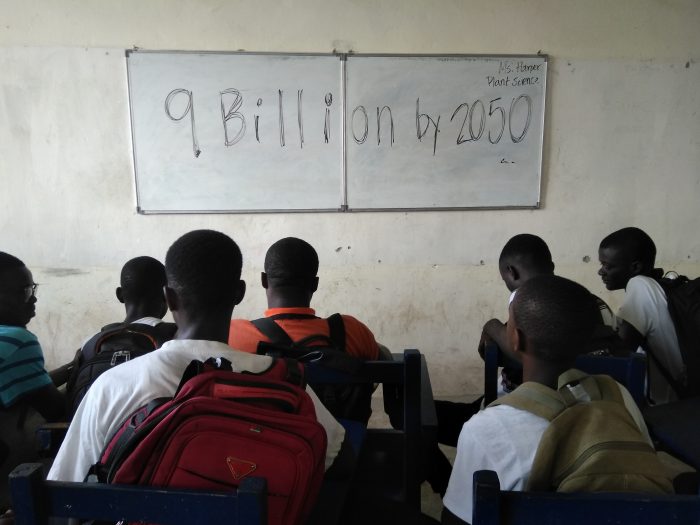I am an educator in two high school classrooms and four National Diploma of Agriculture (similar to an associate degree) classrooms at the Booker Washington Institute in Kakata, Liberia. One of the classes, I teach is a class of 32 small ruminant enthusiasts. Well more realistically, there is me, the small ruminant enthusiast and 32 learners in the classroom. Since August, I have seen the learners transform into enthusiasts and grab hold of so many topics and take adopt them as their own beliefs.
I vividly remember one of the first classes we had together. The semester had a slow start. We had decided to start meeting after school a couple days a week. The topic of discussion was on goat and sheep trends in the world. We had discussed the power of their homogenized milk to be absorbed by the body giving more easily digestible nutrients to humans. We had discussed the advantages of their size to give more manageable harvest and storage in Liberia (a place where consistent electricity and cold storage is often nonexistent). As class was drawing to a close I did as I had done with the plant science class and broke the news about the population increasing to 9.1 billion by 2050.
The room was dim as the sun was setting over the horizon. The dinner bell rang a few minutes early and it signaled hunger in the stomachs of all. They did their best to remain focused on the topic at hand. The foreigner, the “shiny woman” as the neighborhood kids called me before introducing myself was trying to close the topic and portray the big picture of opportunities here.
I asked for the major concern they had in pursuing agriculture, “finding a job” was the immediate reply. It is no wonder why. I said, “The reality is there is an entire generation of people that are uneducated and missing from this  society due to the civil war ages 30 to 45.” I posed the question of, “If we think about that age group, what are they doing now?” “Ms. Harper, they are our ma’s and pa’s.” “They are our teachers and government officials.” “They are our business owners.” I smiled, “That is exactly right.” I tried to contain my excitement, because it makes me talk fast. Talking fast makes my Southern American “serious” English show up and makes it difficult for the learners to understand. I took a second to compose myself and my speed of talking then said, “If you can grasp the importance of small ruminants and all that comes with them: how to care for them, how to manage them, how to make a profit from them… you can change the trajectory for Liberia. If you dedicate yourselves to becoming the best leaders you can be, this classroom of 32 learners can change the integrity of government, industry, and communities.”
society due to the civil war ages 30 to 45.” I posed the question of, “If we think about that age group, what are they doing now?” “Ms. Harper, they are our ma’s and pa’s.” “They are our teachers and government officials.” “They are our business owners.” I smiled, “That is exactly right.” I tried to contain my excitement, because it makes me talk fast. Talking fast makes my Southern American “serious” English show up and makes it difficult for the learners to understand. I took a second to compose myself and my speed of talking then said, “If you can grasp the importance of small ruminants and all that comes with them: how to care for them, how to manage them, how to make a profit from them… you can change the trajectory for Liberia. If you dedicate yourselves to becoming the best leaders you can be, this classroom of 32 learners can change the integrity of government, industry, and communities.”
Still thinking back on it now, I get chills. The class ended a few minutes late and all but seven went to get the promises of the bell. The few that stayed behind wanted to talk more. We discussed the Government of Liberia and the opportunities that lie ahead. We discussed their leadership potential individually. We discussed agriculture and the role it could play moving forward. We even talked about global trends in agriculture and I showed them the law of diminishing return in graph form. I sat with them in a circle for 45 minutes and we just talked about what is and more importantly, what could be. Their wheels spinning and minds clicking, I just basked in the moment listening to their thoughts.
I walked out of the academic building speechless and glowing. This after-class conversation was the first time I felt like a teacher.
You see teaching is more than standing at the front of the room and giving lessons, taking homework, and facilitating learning. The best teachers give you the facts and don’t tell you what to see. The best teachers ask questions, instead of giving answers.
In the months since, I have learned to love every aspect of teaching Liberians. They love to ask questions and get frustrated when I turn the questions right back to them.  Any kind of experiential learning activity is met with a “thank you Ms. Harper for today…” in the sincerest words you have ever heard.
Any kind of experiential learning activity is met with a “thank you Ms. Harper for today…” in the sincerest words you have ever heard.
Teaching in Liberia comes with a multitude of complications, but also with an incredible number of opportunities. I work diligently to incorporate experiential learning activities to encourage students to think critically and embrace an entrepreneurial business mindset in agriculture. I confidently trust leadership and entrepreneurship will transform this post-conflict economy from aid reliant to Liberian owned businesses. And I believe that my students, the young small ruminant enthusiasts with integrity, communication skills, and problem-solving ability, will be at the forefront of government, industry, and communities in making it so.
Megan Harper is an Agricultural Economics graduate from the University of Kentucky. Before becoming an AgriCorps Fellow Megan was a Kentucky State FFA Officer.


